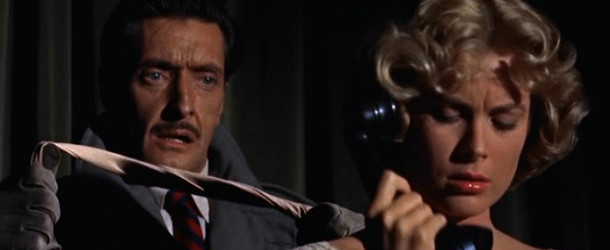I’m usually underwhelmed by the selection Netflix has when it comes to classic films. Oftentimes, they’re just old movies that were probably cheap for them to purchase the rights to. So I always get a little excited when I see a movie on there that I’ve always heard about, but never got around to before. Dial ‘M’ for Murder was one of them. Unfortunately, when a so-called “classic” turns out to be a dud within the first few scenes, the excitement quickly transforms into scrutiny. Be warned, plots will be spoiled in this review.
The movie opens on wealthy London couple Tony (Ray Milland) and Margot (Grace Kelly). They simply read their newspapers as Margot discovers that the Queen Mary is arriving from America. Suddenly, we are shown Margot kissing another man (an American, no doubt), Mark (Robert Cummings). Obviously, they are keeping all of this a secret from Tony. Mark wants Margot to leave her husband, but she insists that her husband has changed for the better in the last year. Not much else is known about these characters except that Tony is a former tennis star and Mark is a successful mystery writer.
Unbeknownst to her, the only reason her husband has seemed different results to his secret plot to have her murdered. He’s been thinking of a way since discovering her affair. Not out of jealousy, mind you, but because he worries that if she leaves him, he’ll have to get a job and support himself. This is the main problem (though there are others) I have with this film–the three primary characters are all deplorable. She’s cheating on her spouse, but she wants to make it work, yet at the same time, gives no indication that she wants to end the affair. And Mark is the man who knows she’s married, but remains with her anyway. I guess since her husband is the shallowest, and also the only one who would have a person murdered with no afterthought, by default, he is the most evil and the one the audience must root against.
Tony hires (or rather, blackmails) an old college chum, and former ex-con, which he’s shamelessly been stalking for the past few months, to strangle his wife when he and Mark attend a stag party at a nearby restaurant. Everything has been calculated to make the murder appear like a burglary gone wrong. Tony seems to have covered every detail to clear himself of any suspicion.
There is, however, one thing he didn’t count on: that Margot would have some fight in her. During the struggle—he attacks her from behind while she’s on the phone with Tony, she manages to stab her strangler with a pair of sewing scissors, and he instantly dies (people always die very easily in Hitchcock movies, otherwise it slows down the story). In a twisted turn of events, Tony manages to manipulate the facts to make Margot look like she murdered a man who had been blackmailing her because he knew about her and Mark’s affair.
This isn’t really done very cleverly. Yes, Tony is cunning, but his plan ultimately relies on Margot’s great stupidity. Once she kills her attacker, she then picks up the receiver and Tony instructs her not to phone the police, and to go sit in her room and wait for him. She obliges. Once the police do arrive, he instructs her not to speak to them and to go to her room and wait for him. She obliges. If that wasn’t insulting enough, the next morning, he tells her that he invented some story about why she didn’t call the police right away, and she readily goes along with it.
Not soon after, Margot is sentenced to be executed. It’s up to Mark to unravel the great “mystery” and save the day! On the day before she’s to be made into plant food, Mark returns to the apartment and pleads with Tony to act like it was all a set up for Tony to kill her. He nails every detail exactly how Tony planned it. I guess if you’re going to plan a murder, you should consider the pieces more carefully when one of the people involved writes about covering up murders for a living. But what’s really annoying is that, while coming up with the story, Mark never bothers to consider if it holds any truth. He even expresses he has trouble coming up with a reason for Tony to kill Margot because “they both love her.” For Mark’s great detective work, he sure didn’t stop to think that Tony might have actually known about the affair for real and want his wife dead as a result?
It’s classic storytelling to make the antagonist smarter than the protagonist, but this is ridiculous. Mark and Margot are so laughably dumb that they deserve one another. In fact, that’s the only real connection they seem to have. Why this affair has ever taken place is never known, other than Tony used to be a chump. Great mysteries have a strong sense of characterization, and this one has about as much as a dial tone.
About two minutes into the film, I thought to myself, “This movie is obviously based on a play.” Yes, it’s dialogue-heavy, but that wasn’t my issue. My concern is that it is, essentially, a photographed play. The camera almost never reveals the back wall of the apartment, so we’re left staring at this set as if it were on a stage. It surprises me, too, because Hitchcock usually worked the camera better than this. Honestly, if you’d seen the play, there’s probably not much reason to see this movie.
And the performances don’t exactly help matters. I know that Grace Kelly is an icon so steeped in pop culture history that it would seem foolish to criticize her, so I won’t. Rather, I’ll criticize the way Hitchcock directed her. Hitchcock oftentimes doesn’t seem to know how to direct women. Sometimes I think he actually likes them dumb. She delivers every single line with the same vocal inflection as Tippi Hedren from The Birds. And I understand that he deliberately directed Kelly to act as though she were in a trance in some of her scenes (so as to appear distant), but she looks goofy. The scene when the inspector first accuses her of the crimes, I thought she just had to sneeze.
Ray Milland delivers his husbandry role confidently and mischievously, just as he should. The lack of characterization in the script works against him, though. We don’t see enough evil in this character. Nothing to make us hate him enough when he turns on his supposed charm for his wife. Perhaps an actor who was well known for having a warm personality, like Jimmy Stewart, by rule, would have added more. Either way, Milland’s character, as is, certainly isn’t out of place here.
Robert Cummings is just there. A cardboard cutout would have worked just as effectively in the first two acts, since he had pretty much nothing to do except listen to everyone else. When he embarks on his quest in the third act to exonerate his beloved, it’s when his character just comes off as dense and a bit annoying. I know he’s frustrated, but he’s constantly interrupting and grabbing things—it appears more childish than heroic.
The major spoiler is when the inspector also comes back to the apartment in a similar effort to clear Margot’s name. I’m not totally familiar with how British law works, and especially not over half a century ago, but Margot is set free and also sent home. Even though they had little evidence to suspect Tony, the inspector, or the powers that be, drop the charges against her, and plot to catch Tony in an act that reveals the set up was, indeed, his idea.
The prosecutor acts as though this is all very exciting, and that he found a key to the apartment that Tony left for the murderer hiding near the front entry. One of the prosecutor’s primary pieces of evidence against Margot was that there appear to be no forced entry, and she couldn’t explain this. Wait, what? So he knew there was a key left outside the door, yet still prosecuted an innocent woman? And when they are all back in the apartment, waiting for Tony to return home, he seems like they should be celebrating a thrilling experience, and not like she was just about to be executed for a crime he needlessly accused her of.
We spend the entire act watching the inspector, and to a less degree Mark, solve this crime. While that’s emotionally gratifying, it’s also very tedious. After all, we saw this crime be planned. It’s no great mystery to us what had happened and once we find out that Margot has been released, the rest is fairly predictable. Is it suspenseful? Yes. A mystery? Not really.
So, in the end, the cheaters prevail. And how? By making the third member of the triangle even worse than they are. It’s a tired and typical approach in this overrated piece of Hitchock’s repertoire.









I could not disagree more! I will not go into all the lengthy details to prove you wrong but it seems to me that you intentionally went into the movie not wanting to like it. You can pick apart anything but it’s really sad that you missed all the complexities of the characters. It about things going wrong. It’s about how you can’t control anything even when you think you’ve thought of everything. It’s whether it not you will do the right thing if given the choice. It’s really sad for you that you chose to dislike such a true classic.
You don’t have to prove anything. Everyone likes and dislikes movies for different reasons. You make some good points, but we’ll just have to disagree. One of the great things about posting reviews is that they encourage discussion and the exchange of interpretations. But I would never waste my time going into a movie just to hate on it. I only add movies to my queue that I’m genuinely interested in watching. I love Hitchcock (the man made some of my favorites films), so I was excited to see this one, as I indicated at the beginning.
But thank you for reading and taking the time to comment.
Well, it’s definitely not my most favorite Hitchcock film. It’s definitely no Strangers on a Train or Rear Window, that’s for sure. But I still enjoy it. Just as I enjoy Notorious–even though none of those characters are really likable either. Not my favorite Hitchcock films, but they do still have some merit.
I think Hitchcock liked to experiment with different ways of filming. Just like Rope, he filmed this in 10 minute increments without any cuts. In fact, in one scene, Margot’s character accidentally calls Mark “Rob” (his real name). You can briefly see her flinch as she realizes that she’s done it…but she keeps going with the scene because Hitchcock didn’t yell cut!
I think he WANTED this to look like the play…to give you the experience of going to the theater in a movie theater.
And here’s the biggest question of them all: why would someone like Grace Kelly marry Ray Milland and then cheat on him with Robert Cummings? Come on…maybe this script needed a little Cary Grant to make things more plausible.
But I’ll tell you this…I would love to have that red dress of Grace Kelly’s!